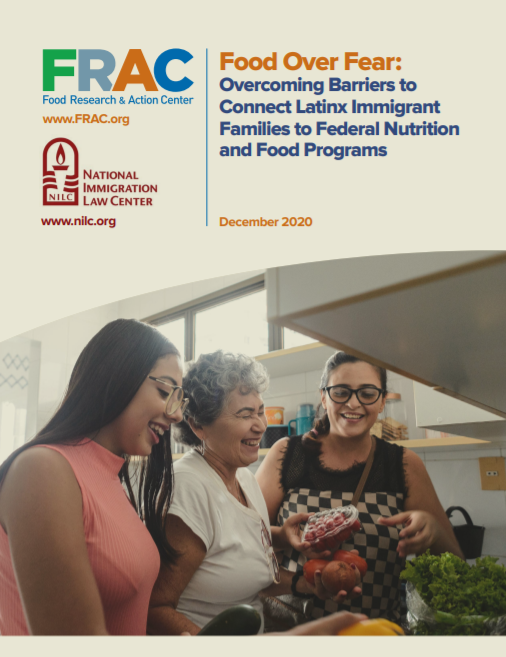FOOD OVER FEAR
Overcoming Barriers to Connect Latinx Immigrant Families to Federal Nutrition and Food Programs
Food Research & Action Center | National Immigration Law Center
The PDF icon at right hyperlinks to FRAC’s website.
 Executive Summary
Executive Summary
This report sheds light on why many immigrant families are forgoing vital assistance from federal nutrition and food programs and lifts up recommendations aimed at ensuring that all families and individuals, regardless of immigration status, are nourished and healthy.
While the findings of this report are informed by a series of focus groups conducted from November 2019 to January 2020 (prior to the onset of COVID-19), the need to connect immigrant families to nutrition programs is arguably of even greater importance given how COVID-19 is fueling unprecedented food insecurity and ravaging communities of color and immigrant communities at disproportionately high rates due to unique barriers faced by families that include noncitizens.
The focus groups that were conducted by the Food Research & Action Center and the National Immigration Law Center, in partnership with state anti-hunger and immigrant rights groups, took place with 64 Spanish-speaking immigrant parents in mixed-status families and 41 nutrition service providers in four locations: Arkansas (Northwest), California (Central Valley), Colorado (Denver), and Illinois (Chicago). Participants were queried about opportunities and obstacles in accessing federal nutrition and food programs, with a focus on the Supplemental Nutrition Assistance Program (SNAP), school meals, the Special Supplemental Nutrition Program for Women, Infants, and Children (WIC), and emergency food.
Data and findings presented in this report from the focus groups are not intended to be representative of the experience of all immigrants in the U.S. Instead, it presents information on the experiences, opinions, and recommendations reported by the focus group participants.
The focus groups were conducted, in part, to gauge the impact of the impending February 2020 implementation of the Trump administration’s change in the U.S. Department of Homeland Security (DHS) public charge rule. The new rule makes it harder for certain immigrants to obtain Lawful Permanent Resident (LPR) status (i.e., a green card). In essence, the revised public charge rule imposes a wealth test. For the first time ever, the new rule requires that DHS consider the use of non-cash benefits, such as SNAP by an individual, as a factor in a public charge determination.
The anticipation of the rule accelerated existing fear and confusion among focus group immigrant families regarding participation in federal nutrition and food programs. It also contributed to a “chilling effect” on participation in SNAP and other vital nutrition programs by eligible immigrants and their family members. This “chilling effect” extended far beyond the very limited number of noncitizens who are eligible for SNAP and subject to a DHS public charge determination. It also extended to participation in programs that are not included in public charge determinations, such as WIC and school meals.
One of the most significant findings revealed by the focus groups’ participants was that immigrant families are forgoing federal nutrition and food programs that are essential to improving their food security, nutrition, health, and well-being; SNAP is the most often avoided. Other findings are as follows:
- Three-quarters of the immigrant parents who participated in the focus groups screened positive for food insecurity.
- More than one-quarter of immigrant parents who were surveyed reported that they stopped using SNAP or other food programs in the last two years due to immigration-related concerns, and this pattern was echoed by nutrition service providers.
- Even when families are eligible for programs and face no public charge concerns, many forgo assistance from the federal nutrition and food programs.
- While immigrant families expressed more fear about accessing SNAP than other federal nutrition and food programs, there are still concerns about participating in such programs, e.g., school meals, WIC, or emergency food.
- Immigrant parents were more willing to access SNAP and WIC for their children than apply for the adults in the family, and to sacrifice their own nutrition for their children’s health.
- Immigrant families are more likely to apply for Medicaid than SNAP.
Another major finding is that a range of obstacles impede immigrant families’ access to federal nutrition and food programs. Other obstacles cited are as follows:
- Immigrant families are afraid to participate in federal nutrition and food programs due to multiple immigration-related concerns.
- Immigrant families are not always familiar with the term “public charge,” despite expressing fears associated with the rule.
- Information that immigrant families receive about the public charge rule through some traditional and digital media outlets and immigration attorneys is often inaccurate. Immigrants also expressed low levels of trust of the accuracy of media reporting on public charge.
- Immigrant families often face language barriers and discrimination when accessing federal nutrition and food programs.
- Immigrant families worry that personal information they submit when applying for federal nutrition and food programs will be shared with immigration enforcement agencies.
- Immigrant families and nutrition service providers lack information about available federal nutrition and food programs, citing confusion about immigrant households’ SNAP eligibility.
- Transportation barriers to access federal nutrition and food programs disproportionately affect immigrant families due to fears of being out in public and vulnerable to attacks by immigration enforcement agencies.
Based on analysis of data compiled from the immigrant parent and nutrition service provider focus groups, this report concludes with recommendations and opportunities to overcome challenges and to connect immigrant families to federal nutrition and food programs. These insights are intended to provide organizations that support immigrant families with ideas and guidance on how to overcome barriers so that immigrant families can feel comfortable accessing vital nutrition programs. Their recommendations are as follows:
- provide accurate information on immigration-related issues that intersect with the ability to access federal nutrition and food programs;
- enlist trusted messengers to craft and disseminate information, as well as to assist with applications, in order to connect immigrant families to available federal nutrition and food programs;
- implement, publicize, and monitor existing policies that help immigrants feel safer when seeking federal nutrition and food program assistance;
- promote policies and procedures to improve access for immigrant families to SNAP and other federal nutrition and food programs; and
- advocate for new policies and programs to help more immigrants address food insecurity.
This report reinforces how a range of attacks on immigrant families — including the public charge rule — have created an environment of heightened fear and confusion that is impeding access to the very programs that can help immigrants thrive. In addition to hostile governmental actions, immigrants also face barriers, some are unique to immigrants while others are also faced by non-immigrants, that can make it more challenging to access programs. These barriers include a lack of information on the range of available nutrition programs, confusing rules regarding noncitizen eligibility, transportation issues, distrust of government agencies, and language access. Supporting immigrants’ access to federal nutrition and food programs is essential to addressing food insecurity and boosting health, achievement, economic security, and opportunity for everyone, as we are all healthier and stronger when everyone in our communities has access to the food and nutrition they need. The recommendations derived from the focus groups data illustrate that we all have a role to play in ensuring that every low-income person and family can access these vital programs.
The full report is available from this FRAC webpage: https://frac.org/research/resource-library/nilc-latinximmigrantfamilies.






